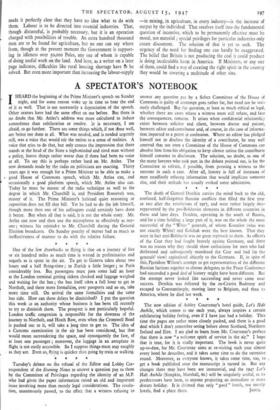Tuesday's debate on the refusal of the Editor and Lobby
Cor- respondent of the Evening News to answer a question put to them by the Committee of Privileges regarding the identity of an M.P. who had given the paper information raised an old and important issue involving more than merely legal considerations. The resolu- tion, unanimously passed, to the effect that a witness refusing to answer any question put by a Select Committee of the House of Commons is guilty of contempt goes rather far, but need not be seri- ously challenged. But the question, at least as much ethical as legal, whether there are cases where a witness must still refuse, and face the consequences, remains. It arises when confidential relationship exists between solicitor and client, between doctor and patient, between editor and contributor and, of course, in the case of informa- tion imparted to a priest in confession. Where an editor has pledged himself not to disclose the identity of a contributor, he may well contend that not even a Committee of the House of Commons can absolve him from his obligation to keep silence unless the contributor himself consents to disclosure. The solution, no doubt, as one of the many lawyers who took part in the debate pointed out, is for the Committee to refrain, if possible, from pressing a witness to the extreme in such a case. After all, history is full of instances of men steadfastly refusing information that would implicate someone else, and their attitude has usually evoked some admiration.


































 Previous page
Previous page